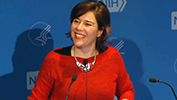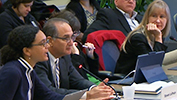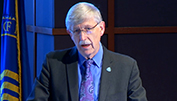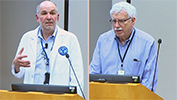-
- NIH VideoCast - Mitochondria control of physiology and disease: beyond ATP
-
- - Navdeep S. Chandel, Ph.D., David W. Cugell Professor of Medicine, Northwestern University (2018/03/09)
- - Category : WALS - Wednesday Afternoon Lectures
- NIH Director???s Wednesday Afternoon Lecture Series
Historically, mitochondria have been primarily viewed as biosynthetic and bioenergetic organelles that generate metabolites for the production of macromolecules and adenosine triphosphate (ATP), respectively. The work of the Chandel laboratory has elucidated that mitochondria have a third distinct role whereby they release reactive oxygen species (ROS) and metabolites to regulate transcription factors and epigenetics. For his lecture, Dr. Chandel will present his lab???s ongoing efforts to understand how mitochondria, in addition to producing ATP, regulate cancer and immunity.
For more information go to https://oir.nih.gov/wals/2017-2018
NIH VideoCast - Mitochondria control of physiology and disease: beyond ATP
-
- NIH VideoCast - Resolution of Inflammation
-
- - Carla Rothlin, PhD, Associate Professor of Immunobiology and HHMI Faculty Scholar, Yale University (2018/03/09)
- - Category : Immunology
- Immunonology IG Seminar
Carla Rothlin was born and raised in Buenos Aires, Argentina. She studied Biochemistry and Pharmacy at the University of Buenos Aires, where she also performed her graduate studies under the direction of Belen Elgoyhen on nicotinic receptors expressed in the inner ear. Following her PhD, Dr. Rothlin moved to San Diego, California and joined Greg Lemke`s lab at the Salk Institute for Biological Studies. While she originally intended to continue her training in Neuroscience, Dr. Rothlin started to work on a family of receptor tyrosine kinases - the TAMs - which introduce her to the immunobiology world. In 2009, Dr. Rothlin joined the Department of Immunobiology at Yale University as an Assistant Professor. Dr. Rothlin laboratory focuses on mechanisms that underlie the regulation of inflammation and the homeostatic control of immune function. Dr Rothlin is currently a Tenured Associate Professor of Immunobiology and a HHMI Faculty Scholar.
NIH VideoCast - Resolution of Inflammation
-
- NIH VideoCast - Contributions of Social and Behavioral Research in Addressing the Opioid Crisis (Day 1)
-
- - NIH (2018/03/08)
- - Category : Conferences
- OBSSR, NIDA, NINDS, NCCIH, and NIMHD have partnered on the planning for a meeting on the social and behavioral contributions to the opioid crisis that covers topics such as the sociocultural and socioeconomic underpinnings of the crisis, the behaviors and systems factors that contribute to initial opioid use, the transition from acute to chronic opioid use, the social and behavioral treatment approaches for chronic pain and chronic opioid use, issues involving treatment in specific subpopulations, and current comprehensive models of care.
NIH VideoCast - Contributions of Social and Behavioral Research in Addressing the Opioid Crisis (Day 1)
-
- NIH VideoCast - Contributions of Social and Behavioral Research in Addressing the Opioid Crisis (Day 2)
-
- - NIH (2018/03/08)
- - Category : Conferences
- OBSSR, NIDA, NINDS, NCCIH, and NIMHD have partnered on the planning for a meeting on the social and behavioral contributions to the opioid crisis that covers topics such as the sociocultural and socioeconomic underpinnings of the crisis, the behaviors and systems factors that contribute to initial opioid use, the transition from acute to chronic opioid use, the social and behavioral treatment approaches for chronic pain and chronic opioid use, issues involving treatment in specific subpopulations, and current comprehensive models of care.
NIH VideoCast - Contributions of Social and Behavioral Research in Addressing the Opioid Crisis (Day 2)
-
- NIH VideoCast - 2018 Demystifying Medicine: Diabetes and Artificial Sweeteners
-
- - Phillip Gorden, MD, NIDDK, NIH and Kristina Rother, MD, NIDDK, NIH (2018/03/08)
- - Category : Demystifying Medicine
- The Demystifying Medicine Lecture Series is designed to help bridge the gap between advances in biology and their applications to major human diseases. The lectures include presentations of patients, pathology, diagnosis, and therapy in the context of major diseases and current research. All clinicians, trainees including fellows, medical students, Ph.D. students, and other healthcare and research professionals are welcome to attend.
For more information go to https://demystifyingmedicine.od.nih.gov
NIH VideoCast - 2018 Demystifying Medicine: Diabetes and Artificial Sweeteners
-
- NIH VideoCast - CC Grand Rounds: The Evolving Role of the Interventional Radiologist in the Treatment of Obesity
-
- - Clifford R. Weiss, MD, FSIR, Associate Professor of Radiology, Surgery and Biomedical Engineering Clinical Director of the Center for Bioengineering, Innovation and Design; Director of Interventional Radiology Research, The Johns Hopkins Hospital (2018/03/08)
- - Category : Clinical Center Grand Rounds
- CC Grand Rounds: The Evolving Role of the Interventional Radiologist in the Treatment of Obesity
For more information go to http://www.cc.nih.gov/about/news/grcurrent.html
NIH VideoCast - CC Grand Rounds: The Evolving Role of the Interventional Radiologist in the Treatment of Obesity
-
- NIH VideoCast - NIH Alzheimer`s Disease Research Summit 2018
-
- - National Institute on Aging, NIH (2018/03/07)
- - Category : Conferences
- The 2018 NIH AD Research Summit will bring together researchers and opinion leaders from academia, industry, federal agencies, private foundations and public advocacy groups working on Alzheimer`s and other complex diseases with the goal to evaluate progress towards the AD research implementation milestones and to continue the development of an integrated, multidisciplinary, translational research agenda necessary to address critical knowledge gaps and enable precision medicine for AD. Key to achieving this goal is the identification of: 1) resources/infrastructure and multi-stakeholder partnerships necessary to successfully implement this research agenda and 2) strategies to engage patients, caregivers and citizens as direct partners in research.
This key strategic planning event is tied to the implementation of the first research goal of the National Plan to Address Alzheimer`s (NAPA), to treat and prevent Alzheimer`s disease by 2025. The 2018 Summit builds on the foundation laid by the NIH AD Research Summits held in 2012 and 2015 and the NIH ADRD Research Summits of 2013 and 2016.
The meeting program will be organized around 7 major themes/sessions:
Novel Mechanistic Insights into the Complex Biology and Heterogeneity of AD
Enabling Precision Medicine for AD
Translational Tools and Infrastructure to Enable Predictive Drug Development
Emerging Therapeutics
Understanding the Impact of the Environment to Advance Disease Prevention
Advances in Disease Monitoring Assessment and Care
Building an Open Science Research Ecosystem to Accelerate AD Therapy Development
Each session will feature progress achieved towards key research implementation milestones and highlight emerging research trends, followed by a moderated panel discussion focused on outstanding questions/knowledge gaps/research needs.
The general program will be followed by a writing session during which a select group of experts together with NIA/NIH staff and NAPA Council members will evaluate progress to date and formulate recommendations which will be used as the basis for updating and refining the research implementation milestones for measuring progress towards the goal to prevent and treat AD by 2025.
NIH VideoCast - NIH Alzheimer`s Disease Research Summit 2018
-
- NIH VideoCast - NIH Rare Disease Day 2018
-
- - NIH (2018/03/07)
- - Category : Conferences
- Jointly sponsored by the National Center for Advancing Translational Sciences and Clinical Center at the National Institutes of Health (NIH), Rare Disease Day at NIH aims to raise awareness about rare diseases, the people they affect and NIH research collaborations to advance new treatments. This free event features presentations, posters, exhibits, an art show and tours of the NIH Clinical Center.
For more information go to https://ncats.nih.gov/rdd
NIH VideoCast - NIH Rare Disease Day 2018
-
- NIH VideoCast - A Conversation about Graphic Medicine
-
- - Patricia Brennan, RN, Ph.D. NLM, NIH, Ellen Forney, NLM, NIH MK Czerweic, RN, MA, NLM, NIH and Michaek Green, MD, MS, NLM, NIH (2018/03/07)
- - Category : History of Medicine
- A special public program in conjunction with Graphic Medicine: Ill-Conceived and Well Drawn, a new NLM special display, traveling banner exhibition, and online exhibition launching in January 2018.
Dr. Patti Brennan, director of the NLM, will explore the meaning of graphic medicine, an emerging genre of medical literature that combines the art of comics and personal illness narrative. She will be joined by Graphic Medicine guest curator, artist, author, and educator Ellen Forney; MK Czerwiec, a nurse and senior fellow at the George Washington School of Nursing Center for Health Policy and Media Engagement, and artist and author of Taking Turns: Stories from HIV/AIDS Care Unit 371, and Dr. Michael Green, physician and professor in the Departments of Humanities and Internal Medicine at Penn State University. Dr Green, Ms Czerwiec and others, wrote Graphic Medicine Manifesto, which outlines the principles of graphic medicine and begins to map the field.
NIH VideoCast - A Conversation about Graphic Medicine
-
- NIH VideoCast - Of Hairy and Feathered Primates ??? Neurobiology of Numerical Competence in Monkeys and Crows
-
- - Andreas Nieder, Ph.D., University of Tuebingen, Germany (2018/03/07)
- - Category : Neuroscience
- NIH Neuroscience Series Seminar
Research in Dr Nieder???s lab is directed at understanding how abstract information, such as numbers and quantities, is represented and processed in the primate brain. To that end, they focus on parietal and frontal association cortices that operate at the apex of the cortical hierarchy. Their overall goal is to understand how higher brain centers enable intelligent, goal-directed behaviors, thus paving the way for a better understanding during its dysfunction in diseases.
Studies with behaviorally trained non-human primates that were carried out in the group characterized single neurons coding numerical quantity irrespective of specific sensory stimulus attributes, and identified a parieto-frontal network of such neurons. This work complemented the emerging picture of the foundations of numerical competence in humans based on functional imaging and lesion studies, showing that the response properties of neurons can explain basic psychophysical findings. Neurons in the parietal and frontal lobe extract different forms of abstract quantity, ranging from number to spatial size and proportions. Moreover, prefrontal cortex (PFC) cells in the macaque encode semantic associations between set size and arbitrary visual signs.
Important as it is as a first step, the mere representation of magnitude does not however constitute a cognitive advantage to an organism in and of itself. Although quantities are extracted from sensory input at the cortical level, such quantities need to be further processed by integrating different sources of external and internal information before they can successfully influence behavior.
Thus they have recently started to study single-neuron mechanisms of cognitive control functions and decisions based on numerical rules. These data showed that single PFC neurons have the capacity to represent flexible operations on the most abstract numerical quantities. Their findings support PFC network models implementing specific ???rule-coding??? units that control the flow of information between segregated input, memory and output layers.
They speculate that these neuronal circuits in the monkey PFC could have been readily adopted in the course of primate evolution for the syntactic processing of numbers in formalized mathematical systems. They will now investigate how cognitive control via rules applied to multiple magnitudes and multiple magnitude rules applied to numerical quantity can emerge.
For more information go to https://neuroscience.nih.gov/neuroseries/Home.aspx
NIH VideoCast - Of Hairy and Feathered Primates ??? Neurobiology of Numerical Competence in Monkeys and Crows
-
- NIH VideoCast - CC Grand Rounds: 1) Systems Science Approaches to Evaluate the Impact of Social Determinants of Health on Cardiometabolic Risk and 2) Ultra-low Radiation Dose Computed Tomography (CT) Imaging: How Low Can We Go?
-
- - 1) Tiffany Powell-Wiley, MD, MPH Chief, Social Determinants of Obesity and Cardiovascular Risk Laboratory, Division of Intramural Research, NHLBI, NIH and 2) Marcus Chen, MD Assistant Clinical Investigator, Cardiovascular and Pulmonary Branch, NHLBI, NIH (2018/03/02)
- - Category : Clinical Center Grand Rounds
- CC Grand Rounds: 1) Systems Science Approaches to Evaluate the Impact of Social Determinants of Health on Cardiometabolic Risk and 2) Ultra-low Radiation Dose Computed Tomography (CT) Imaging: How Low Can We Go?
For more information go to http://www.cc.nih.gov/about/news/grcurrent.html
NIH VideoCast - CC Grand Rounds: 1) Systems Science Approaches to Evaluate the Impact of Social Determinants of Health on Cardiometabolic Risk and 2) Ultra-low Radiation Dose Computed Tomography (CT) Imaging: How Low Can We Go?
-
- NIH VideoCast - Race, risk, and resilience: understanding racial differences in cognitive aging and brain pathology
-
- - Lisa Barnes, Ph.D., Professor, Departments of Neurological Sciences and Behavioral Sciences, Rush University Medical Center (2018/03/02)
- - Category : WALS - Wednesday Afternoon Lectures
- NIH Director???s Wednesday Afternoon Lecture Series
Older African-Americans, a rapidly growing segment of the U.S. population, bear a disproportionate burden of Alzheimer???s disease and cognitive impairment compared to non-Hispanic whites, with some estimates suggesting that they may have more than a two-fold increased risk than their white counterparts. Recent studies have led to significant advances in our understanding of the underlying neurobiologic substrates of Alzheimer???s disease. But because of challenges in the recruitment of African-Americans into research studies and an unfortunate lack of clinical and biologic data in this population, knowledge of the drivers of the disparities has lagged behind. The ability to identify therapeutic targets and effective interventions for this population has become a public-health imperative. In this lecture, Dr. Barnes will present data from several longitudinal cohort studies of older African-Americans on how risk factors and resilience markers impact cognitive aging. She will also discuss preliminary data on racial differences in brain pathology measured at death. The data may lead to opportunities in identifying new mechanisms and new knowledge for Alzheimer???s disease, cognitive impairment, and cognitive decline.
For more information go to https://oir.nih.gov/wals/2017-2018
NIH VideoCast - Race, risk, and resilience: understanding racial differences in cognitive aging and brain pathology
-
- NIH VideoCast - National Advisory Council on Minority Health and Health Disparities - February 2018
-
- - NIMHD, NIH (2018/03/01)
- - Category : Advisory Board Meetings and Workshops
- This is the 47th Meeting of the National Advisory Council on Minority Health and Health Disparities.
NIH VideoCast - National Advisory Council on Minority Health and Health Disparities - February 2018
-
- NIH VideoCast - Task Force on Research Specific to Pregnant Women and Lactating Women (Day 2)
-
- - NICHD, NIH (2018/03/01)
- - Category : Conferences
- The Task Force is charged with providing advice and guidance to the HHS Secretary on federal activities related to identifying and addressing gaps in knowledge and research on safe and effective therapies for pregnant women and lactating women, including the development of such therapies and the collaboration on and coordination of such activities.
NIH VideoCast - Task Force on Research Specific to Pregnant Women and Lactating Women (Day 2)
-
- NIH VideoCast - 2018 Demystifying Medicine: The Great Neglected Diseases
-
- - Thomas Nutman, MD, NIAID, NIH and Alan Sher, PhD, NIAID, NIH (2018/03/01)
- - Category : Demystifying Medicine
- The Demystifying Medicine Lecture Series is designed to help bridge the gap between advances in biology and their applications to major human diseases. The lectures include presentations of patients, pathology, diagnosis, and therapy in the context of major diseases and current research. All clinicians, trainees including fellows, medical students, Ph.D. students, and other healthcare and research professionals are welcome to attend.
For more information go to https://demystifyingmedicine.od.nih.gov
NIH VideoCast - 2018 Demystifying Medicine: The Great Neglected Diseases
-
- NIH VideoCast - Task Force on Research Specific to Pregnant Women and Lactating Women (Day 1)
-
- - NICHD, NIH (2018/02/28)
- - Category : Conferences
- The Task Force is charged with providing advice and guidance to the HHS Secretary on federal activities related to identifying and addressing gaps in knowledge and research on safe and effective therapies for pregnant women and lactating women, including the development of such therapies and the collaboration on and coordination of such activities.
NIH VideoCast - Task Force on Research Specific to Pregnant Women and Lactating Women (Day 1)
-
- NIH VideoCast - Brain-Machine Interfaces for Restoration of Motor Function and Communication
-
- - Jaimie Henderson, M.D., Ph.D., Stanford University (2018/02/27)
- - Category : Neuroscience
- NIH Neuroscience Series Seminar
Jaimie Henderson, M.D. is director of the Stanford program in Stereotactic and Functional Neurosurgery, and co-director (with Prof. Krishna Shenoy, PhD) of the Stanford Neural Prosthetics Translational Laboratory (NPTL). His research interests encompass several areas of stereotactic and functional neurosurgery, including frameless stereotactic approaches for therapy delivery to deep brain nuclei; mechanisms of action of deep brain stimulation; cortical physiology and its relationship to normal and pathological movement; neural prostheses; and the development of novel neuromodulatory techniques for the treatment of neurological diseases. During his residency in the early 1990???s, Dr. Henderson was intimately involved with the development of the new field of image-guided surgery. This innovative technology has revolutionized the practice of neurosurgery, allowing for safer and more effective operations with reduced operating time. Dr. Henderson remains one of the world???s foremost experts on the application of image-guided surgical techniques to functional neurosurgical procedures such as the placement of deep brain stimulators for movement disorders, epilepsy, pain, and psychiatric diseases. His work with NPTL focuses on the creation of clinically viable interfaces between the human brain and prosthetic devices to assist people with severe neurological disability.
For more information go to https://neuroscience.nih.gov/neuroseries/Home.aspx
NIH VideoCast - Brain-Machine Interfaces for Restoration of Motor Function and Communication
-
- NIH VideoCast - Clinicopathologic Grand Rounds: Clinical Cases from the NIH Clinical Center Rapid/Warm Autopsy Program
-
- - 1) Nitin Roper MD, Clinical Fellow, Medical Oncology Service, NCI, NIH 2) David Kleiner MD, PhD, Senior Research Physician; Director, Laboratory Information System and Chief, Post-mortem Section, Laboratory of Pathology, NCI, NIH and 3) Udayan Guha, MD, PhD, Investigator, and Head, Cancer Signaling Networks Section, Thoracic and Gastrointestinal Oncology Branch, NCI, NIH (2018/02/23)
- - Category : Clinical Center Grand Rounds
- Clinicopathologic Grand Rounds: Clinical Cases from the NIH Clinical Center
Rapid/Warm Autopsy Program
For more information go to http://www.cc.nih.gov/about/news/grcurrent.html
NIH VideoCast - Clinicopathologic Grand Rounds: Clinical Cases from the NIH Clinical Center Rapid/Warm Autopsy Program
-
- NIH VideoCast - Macrophages and lymphatics: guardians of the tissue microenvironment
-
- - Gwen Randolph, PhD, Washington University in St. Louis (2018/02/23)
- - Category : Immunology
- Immunonology IG Seminar
Gwen Randolph received her PhD in Cellular and Molecular Pathology from SUNY, Stonybrook, and completed post-doctoral training at the Rockefeller University and Cornell University Medical Center under the mentorship of Ralph Steinman and William Muller. She joined the faculty at Cornell/Weill Medical College Cornell, and then spent 11 years at Mount Sinai School of Medicine, before moving to Washington University in 2011, where she is now an endowed professor, and head of the immunology graduate program in the Department of Pathology and Immunology. Dr. Randolph has made many major contributions to our knowledge of dendritic cell (DC) and macrophage development, trafficking, and functions. While the breadth of her studies reflect her masterful knowledge in this field, she has developed a particular focus on DC and macrophage development and trafficking to lymph nodes across blood and lymphatic vessels, and the roles of DCs and monocyte/macrophages in the pathogenesis of atherosclerosis. Furthermore, she has pioneered studies exploring the cross-talk between immune cells and lymphatic vessels in the regulation of tissue inflammation and homeostasis by controlling the flux of cells and molecules out of tissues. Dr. Randolph is a creative and original scientist who will no doubt open your mind to these new and exciting areas of research.
https://wupathlabs.wustl.edu/randolph
NIH VideoCast - Macrophages and lymphatics: guardians of the tissue microenvironment
-
- NIH VideoCast - Prenatal genomic testing and disability rights
-
- - Tom Shakespeare, MPhil, Ph.D., Professor, Disability Research, Norwich Medical School, University of East Anglia (2018/02/23)
- - Category : Special
- Tom Shakespeare is Professor of Disability Research at Norwich Medical School, University of East Anglia.He is a member of the Nuffield Council on Bioethics and chaired the working party which produced their recent report on Non-Invasive Prenatal Diagnosis. He is also part of a Hastings Center project on the future of prenatal diagnosis. He will speak about prenatal genomic testing and disability rights.
NIH VideoCast - Prenatal genomic testing and disability rights






















